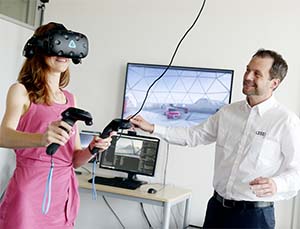Audi is testing the learning of the future. On floor space of approximately 500 square meters, the car manufacturer is trying out the infrastructure for new training formats in the company’s own Audi Academy.
 Nowadays, this includes software labs as well as self-learning rooms and labs for virtual reality or 3D printing. These are key components for the digital learning ecosystem in which Audi plans to train its employees in the future.
Nowadays, this includes software labs as well as self-learning rooms and labs for virtual reality or 3D printing. These are key components for the digital learning ecosystem in which Audi plans to train its employees in the future.
Conveying the right competencies at the ideal time, individually prepared, accessible anywhere in the world and always available. With this aim, Audi is addressing the training of its employees for strategic topics of the future such as digitalisation and electric mobility. The company is currently testing various concepts and ideas in this connection at the Audi Academy in Ingolstadt.
Among other things, a virtual reality lab has been set up in which the format is to be tested for training purposes. Such VR training courses are already in use to train employees in the production of the Audi e-tron in Brussels or in logistics.
Next door, a so-called self-learning room is being tested. Here, the optimal environment for further training close to the workplace is being researched. The content for digital qualifications is produced in various media production studios and software labs.
This is where Audi trainers and experts can independently create podcasts, screencasts or videos for their respective training areas. The smallest studio is just as big as a backpack: With the “multicorder,” trainers have their own TV studio in a bag and can record training content, such as new workflows in production, and prepare it for seminars or webinars.
“The demands placed on further training are changing faster and faster, so the knowledge we gain here flows continuously into our qualification programs,” stated Michael Schmid, Head of the Audi Academy.
“In this way, we are developing a learning ecosystem in which we can prepare employees specifically for future challenges.”
The subject of training and qualifications is a key element of the transformation plan with which Audi is making itself fit for the transition into a premium digital car company. In 2018, the company therefore increased its budget for further training by a third to €80 million. By 2025, AUDI AG plans to invest more than half a billion euros.
“We members of the Works Council supported this budget, because further training and qualifications are the key to an employee-friendly future in the digital age, in which people must continue to be the focus of attention,” explained Jürgen Wittmann, the responsible member of the Works Council.
Audi gathers together all activities relating to training and expertise development at the company’s own Audi Academy. The spectrum of topics covered ranges from technical and interdisciplinary training to measures for personnel development, management and cooperation culture, as well as training in social and entrepreneurial skills and intercultural further training.
An overview of the new learning infrastructure at Audi:
Virtual reality lab: Testing new virtual learning formats. VR training is used, for example, in training courses for the Audi e-tron to familiarize employees with the electric drive system, as well as in logistics.
3D printer room: A learning environment for training various 3D-printing technologies.
Self-learning rooms: Close to workplaces, a learning environment for further training. A balance will be created between retreat possibilities in quiet islands and the possibility for quick communication and networking within the team.
Creative rooms: Innovative, stimulating environment for meetings, workshops or seminars. Rooms are currently being tested with various working zones, for project work for example.
Distance-learning rooms: Technically equipped for training courses in which participants and trainers are not at the same location, but enabling the same interaction as presence training.
Software labs: Here, trainers and experts will find the necessary tools to easily create and prepare digital learning content.
Studios: The possibilities range from production rooms for podcasts and screencasts to video studios, for recording expert lectures for example.
Multicorder: Mobile video studio “in a bag”. Trainers can record workshops, workflows or presentations directly on site and prepare them for future events.
